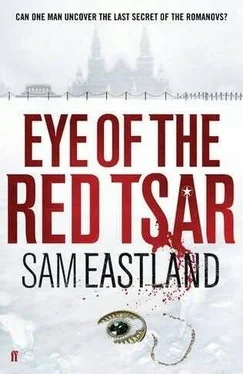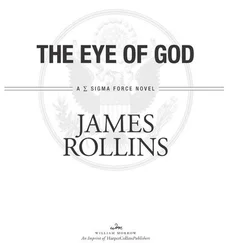Pekkala breathed the stagnant air. “Why isn’t anyone living here now?”
“The house was closed down as soon as the Romanovs disappeared. Nikolai Ipatiev, the man who owned it, left for Vienna and never came back.”
“Look.” Kirov pointed to bullet gashes in the wallpaper. “Let’s get out of here. Let’s go to the hotel.”
“What hotel?” asked Anton.
Kirov blinked at him. “The one where we are staying while we conduct the investigation.”
“We’re staying here,” replied Anton.
Kirov ’s eyes widened. “Oh, no. Not here.”
Anton shrugged.
“But this place is empty!” protested Kirov.
“It won’t be when we’re in it.”
“I mean there’s no furniture!” Kirov pointed into the front room. “Look!”
Along one wall of the empty room, tall windows looked out into the street. Curtains made of heavy dark green velvet had not only been closed, they had also been stitched together so that there was no way to open them.
Kirov pleaded with them. “There’s got to be a hotel in town, one with a decent bed.”
“There is,” said Anton, “but it’s not in the budget.”
“What’s that supposed to mean?” Kirov demanded. “Can’t you just wave those orders around and get us whatever we want?”
“The orders say that this is where we are to make our headquarters.”
“Maybe there are beds on the second floor,” suggested Pekkala.
“Yes,” said Kirov. “I’ll check.” He raced up the stairs, the lantern swinging in his hand, long shadows trailing after him like snakes.
“There are no beds,” muttered Anton.
“What happened to them?” Pekkala asked.
“Stolen,” Anton replied, “along with everything else. When the Ipatiev family moved out, they were allowed to bring some of their possessions-pictures and so on. By the time the Romanovs arrived, only the essentials remained. When we left town, the good people of Sverdlovsk came in before the Whites arrived and stripped the place bare. By the time they got here, there was probably nothing left worth stealing.”
Kirov stomped around upstairs. As he moved from room to room, the floorboards creaked under his weight. His curses echoed through the house.
“Where is the basement?” asked Pekkala.
“This way,” said Anton. Carrying a lantern, he led Pekkala through the kitchen to a pale yellow door, greasy fingerprints smudged around its old brass handle.
Anton opened the door.
A plain wooden staircase led down into the dark.
“Down there,” Anton told him, “is where we found the guards.”
The two men descended to the basement. On their left, at the bottom of the stairs, they came upon a coal storage chamber. A trapdoor in the ceiling opened to allow the coal to be poured in from ground level. What remained in the chamber was mostly dust, heaped in the corners. Only a few nuggets of coal lay strewn around the floor. It seemed as if even the coal had been stolen. To their right was a room which would normally have been closed off with a double set of doors, but the doors were open, revealing a space four paces wide by ten paces long, with a low, arched ceiling. Stripes of white and pinkish red papered the walls. On the pink stripes, Pekkala saw a repeating image which reminded him of a stylized design of a small tortoise. Rooms like this were used for the storage of clothing during the seasons when it was not being used.
Tidy as the place must once have been, it was now destroyed. Huge chunks of the wallpaper were missing, revealing a latticework of plaster, earth, and stone, much of which was now strewn across the floor. Bullet holes pocked the walls. Large stains of dried blood patched the ground, mixing with crumbs of mortar to form crusts like dark brown shields lying scattered on an ancient battlefield. Streaks of blood appeared to hang suspended in the air, and only by focusing hard could Pekkala see that they had, in fact, been splashed across the walls.
“Based on what Katamidze told me,” he said, “the guards were killed upstairs and dragged down here, probably to confuse investigators about where all this blood came from.”
“If you say so.” Anton looked around nervously. The bullet holes in the walls seemed to peer at them like eyes.
Pekkala spotted the lips of cartridge rims lying in the dust. Bending down, he picked one up and turned it over in his fingers. He used his thumb to rub away dust from the base and saw a tiny dent in the center where the gun’s firing pin had ignited the percussion cap. The markings around the base were Russian, dated 1918, indicating that the ammunition had been new when it was fired. Gathering up a handful of other cartridges, he noted that they were all made by the same manufacturer and all bore the same date.
“I have been meaning to talk to you,” said Anton.
Pekkala turned to his brother, who stood like a statue, lantern raised above his head to light the room. “About what?”
Anton glanced over his shoulder, to check that Kirov was nowhere around. “About that thing you called a fairy tale.”
“You mean the Tsar’s treasure?”
Anton nodded. “You and I both know it exists.”
“Oh, it exists,” agreed Pekkala. “I won’t argue with that. The fairy tale is that I know where it’s hidden.”
Anton struggled to contain his frustration. “The Tsar kept no secrets from you. You may be the only one on earth he really trusted. He must have told you where he hid his gold.”
“Even if I did know where it was,” Pekkala said, “it’s precisely because the Tsar did trust me that I would not think of taking it.”
Anton reached out and gripped his brother’s arm. “The Tsar is dead! His blood is on the floor beneath your feet. Your loyalty now is to the living.”
“If Alexei is alive, that gold belongs to him.”
“And after what your loyalty has cost you, don’t you think that you deserve some of it as well?”
“The only gold I need is what the dentist put in my teeth.”
“And what about Ilya? What does she deserve?”
At the mention of her name, Pekkala shuddered. “Leave her out of this,” he said.
“Don’t tell me you’ve forgotten her,” Anton taunted.
“Of course not. I think about her all the time.”
“And you think perhaps she has forgotten you?”
Pekkala shrugged. He seemed to be in pain, as if his shoulder blades had grown too heavy for his back.
“You waited for her, didn’t you?” Anton insisted. “Then who’s to say she did not wait for you? She paid a price for her loyalty, too, but her loyalty was not to the Tsar. It was to you. And you owe it to her, when you find her again, to make sure she doesn’t end up begging in the street.”
Pekkala’s head was spinning. The patterns on the wallpaper danced before his eyes. It seemed to him the dull brown stains upon the floorboards were shining once again with the glimmer of fresh blood.
It was March 1917.
Pekkala heard a knocking at the door of his cottage on the Tsarskoye Selo estate, where he had been confined for months.
When he answered the door, he was astonished to see the Tsar standing there. Even though they were both prisoners here, the Tsar had never come to visit him before. In the peculiar balance of their lives, and even in a time like this, Pekkala’s privacy was more sacred than the Tsar’s.
The Tsar had aged in the past two months. The skin under his eyes sagged. The color was leached from his cheeks. He wore a slate gray tunic with plain brass buttons and a collar buttoned tight against his throat. “May I come in?” he asked.
“Yes,” Pekkala answered.
The Tsar waited a moment. “Then perhaps you could step aside.”
Pekkala almost tripped over himself getting out of the way.
Читать дальше










